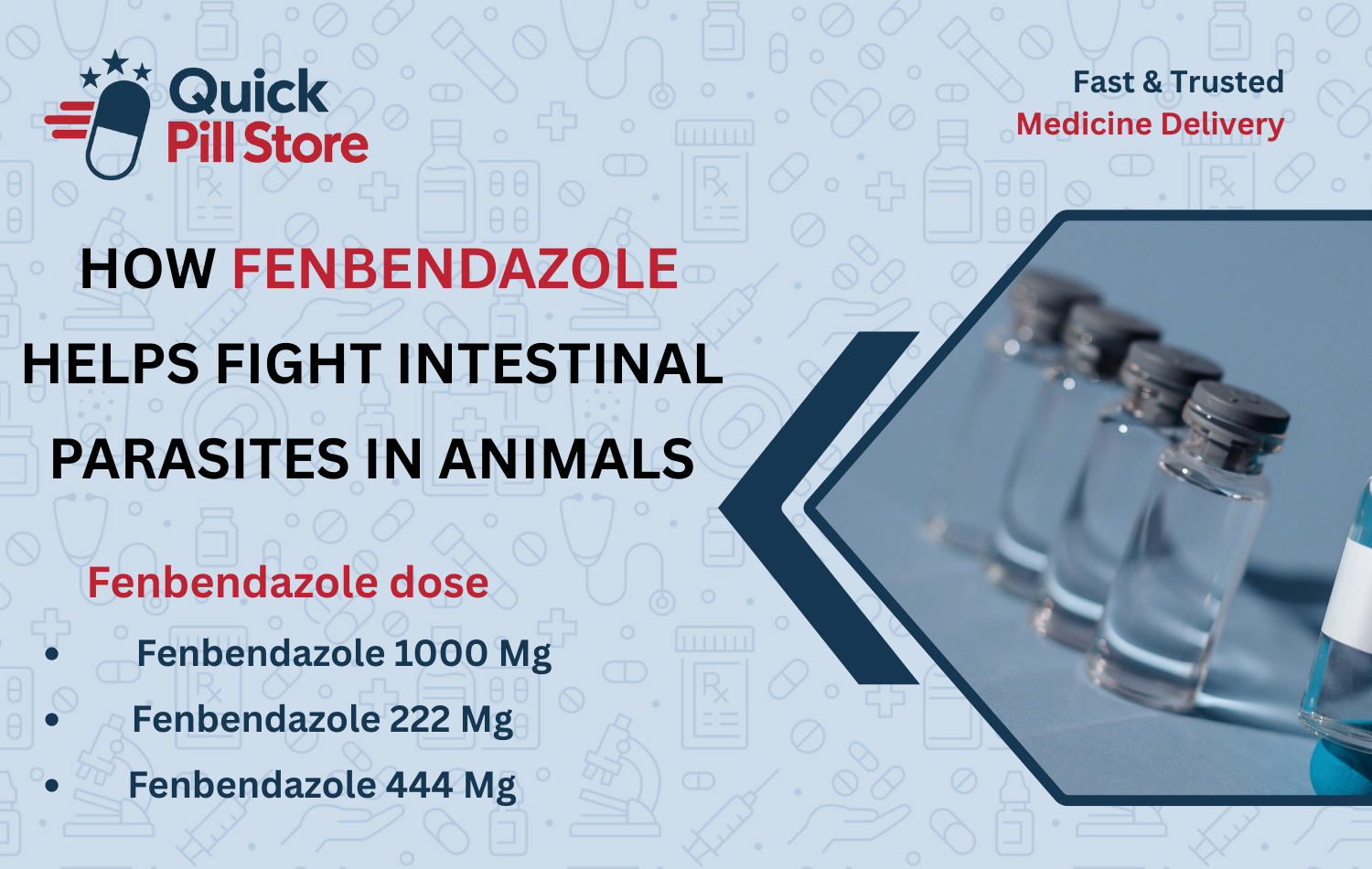Fenbendazole is a powerful, broad-spectrum anthelmintic medication widely used in veterinary medicine to treat intestinal parasite infections in animals. Whether it’s a beloved pet or farm livestock, parasitic infestations can harm overall health, stunt growth, and even cause death if left untreated. In such cases, fenbendazole proves to be an essential treatment option for deworming and parasite control.
This blog explores how it works, which parasites it targets, the species it’s used on, proper dosage, and why it’s a preferred dewormer in veterinary practice.
What is Fenbendazole?
it belongs to the benzimidazole class of medications. It’s commonly used to treat gastrointestinal parasitic infections by interfering with the worms’ energy metabolism. This causes the parasites to starve and die, which are then expelled from the animal’s body.
Fenbendazole is effective against:
- Roundworms (Ascarids)
- Hookworms
- Whipworms
- Tapeworms (in certain species)
- Strongyles
- Pinworms
- Lungworms (in some cases)
What is Fenbendazole 1000 mg?
Fenbendazole 1000 mg refers to a high-strength dose, typically available as a bolus tablet. It is specifically designed for large animals such as cattle, buffalo, sheep, goats, and horses, where higher body weight requires a potent dose for effective deworming.
In many formulations, Fenbendazole is also available in:
- 150 mg and 222 mg tablets (for dogs and cats)
- 500 mg or 1.5 g boluses (for larger animals)
- Paste and suspension forms for ease of administration
Animals Commonly Treated
it is used in a wide range of species, including:
1. Cattle and Buffalo
- Used to eliminate parasites like Haemonchus, Trichostrongylus, and Ostertagia that affect digestion and milk production.
2. Goats and Sheep
- Helps in controlling gastrointestinal strongyles and lungworms which impact productivity and wool quality.
3. Horses
- Effective against strongyles, pinworms, and roundworms. Often administered as part of rotational deworming programs.
4. Dogs and Cats (lower doses like 150 mg or 222 mg)
- Used to treat giardia, roundworms, whipworms, and hookworms.
How Fenbendazole Works
it works by binding to β-tubulin in the parasite’s cells. This action disrupts microtubule formation, which interferes with the worm’s ability to absorb nutrients. Deprived of energy, the worms die and are excreted from the body.
It’s slow-acting, meaning it kills worms gradually over 2–3 days, which reduces the risk of intestinal blockage from dead parasites.
Recommended Dosage
Dosing depends on species, age, and weight. Here’s a basic guide:
| Animal | Dosage | Frequency |
|---|---|---|
| Cattle | 7.5 mg/kg body weight | Once or as prescribed |
| Sheep/Goat | 5–10 mg/kg body weight | Repeat every 3–6 months |
| Horses | 5 mg/kg body weight | Often part of deworming cycle |
| Dogs/Cats | 50 mg/kg for 3 days | Lower strength tablets used |
Always consult a veterinarian before administering Fenbendazole 222 mg or adjusting any dosage.
Parasites Treated by
Some of the major parasites targeted by Fenbendazole include:
- Toxocara canis (in dogs)
- Ancylostoma caninum (hookworm)
- Trichuris vulpis (whipworm)
- Taenia spp. (tapeworm)
- Haemonchus contortus (barber pole worm in sheep)
- Strongylus vulgaris (strongyle in horses)
Benefits of Using
1. Broad-Spectrum Activity
Kills a wide variety of gastrointestinal worms.
2. Safe for Most Animals
it has a high safety margin and is generally well-tolerated.
3. Flexible Formulations
Available in tablets, paste, suspensions, and granules — suitable for different animal types and sizes.
4. Minimal Side Effects
Usually mild — may include temporary diarrhea or appetite loss.
5. Low Risk of Resistance (with proper use)
Can be used in rotation with other dewormers to avoid resistance.
Important Precautions
Do not overdose. High doses can cause toxicity.
- Not suitable for every pregnancy stage in animals. Use under vet supervision.
- Use full course even if symptoms disappear early.
- Avoid using expired products — reduced efficacy.
Final Thoughts
Fenbendazole 444 is a trusted and effective solution for treating a wide range of intestinal parasites in animals. Whether it’s for large livestock or small pets, using fenbendazole it under veterinary guidance ensures safety, better health outcomes, and improved productivity in animals.
By staying informed and following proper dosing practices, you can protect your animals from harmful parasites and promote their overall well-being.
FAQ
1. What is Fenbendazole used for?
it is used to treat intestinal parasite infections in animals such as cattle, goats, sheep, horses, and sometimes pets like dogs. It is effective against roundworms, hookworms, whipworms, strongyles, and some tapeworms.
2. Is Fenbendazole safe for all animals?
Yes, when used correctly and in proper dosage, it is safe for most animals. However, always consult a veterinarian before using it, especially in pregnant animals or pets.
3. Can I give fenbendazole to my dog?
it is a high-strength dose usually meant for large livestock. Dogs are typically treated with lower doses like 150 mg or 222 mg tablets. Giving a high dose without proper calculation can be harmful.
4. How often should animals be dewormed with Fenbendazole?
Deworming frequency varies by species and parasite risk. Typically:
- Livestock: Every 3–6 months
- Dogs & Cats: Every 3 months or as advised by a vet
5. Does it have side effects? A: Side effects are rare but may include:
- Mild diarrhea
- Vomiting (in pets)
- Temporary loss of appetite
If symptoms persist, consult a veterinarian immediately.
6. Can Fenbendazole be used for tapeworms?
this is effective against some types of tapeworms like Taenia species, but it may not work well against Dipylidium caninum. In such cases, a different dewormer like praziquantel may be needed.
7. Is a prescription required for Fenbendazole?
In many countries, yes — you should use Fenbendazole under veterinary supervision to ensure correct dosage and safety.
8. Where can I buy Fenbendazole ?
It is available at veterinary pharmacies, agricultural supply stores, and trusted online platforms. Always check for authenticity and expiry before use.
9. Can humans take Fenbendazole?
Fenbendazole is not approved for human use. While some anecdotal claims exist online, using veterinary medicine in humans without medical supervision is dangerous and not recommended.


[…] Fenbendazole 1000 mg is a high strength antiparasitic product used for deep internal cleansing. […]